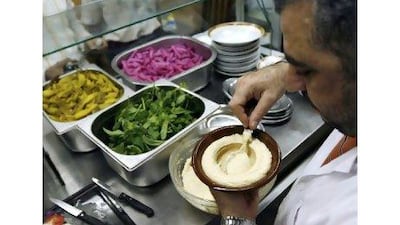Fiona Beckett and Fiona Sims, known to their fans as the 2Fionas, have carved out successful careers as food, wine and travel writers. They were in Beirut last week as guests of the Union Vinicole du Liban, which is conducting a campaign to promote Lebanon as a wine-making nation to UK consumers. Food and wine are cosy bedfellows, so Ms Beckett and Ms Sims were wearing both hats to paint an all-round pleasing picture, not only of Lebanon's burgeoning oenological promise, but also its vast gastronomic heritage.
They were not disappointed, and it occurred to me as I schlepped around Beirut with these two jolly women sampling typical Lebanese grub, that a) food writing is not for the faint-hearted and b) the ministry of tourism really should pay more attention to promoting Lebanon as a foodie destination because (and let's not forget that these two travel a lot) Fionas B and S were mesmerised.
The problem is that Lebanon has never really left its comfort zone when it comes to wooing tourists. Even in its 1960s heyday, when Beirut was the Paris, and Lebanon the Switzerland, of the Middle East, and the likes of Jean-Paul Belmondo, David Niven, Brigitte Bardot and a host of other beautiful people came to frolic, Beirut was predominantly a playground for Arabs who liked, as they still like our sense of fun.
This is still the case, and it is this reliance on the riyal, the dirham and the dinar that overshadows Lebanon's other assets. These will surely appeal to a new segment of tourist, the affluent and educated long-haul traveller who is either hungry to experience Lebanon's wealth of historical and religious sites or might welcome the opportunity to hike or bike in what is left of the country's unspoilt landscape.
Dubai may be the getaway for the Hello magazine crowd, but it is unlikely that Wayne and Coleen Rooney will be salivating at the prospect of visiting Baalbek's awe-inspiring Temple of Jupiter. There are, however, many hundreds of thousands of professional middle-class Europeans who would. I am also pretty certain that they would also like to sample Lebanon's hundreds of recipes from the various parts of the country.
Indeed, the edgier side of Lebanese cooking appears to be very much in demand by global consumers. Anissa Helou, the London-based Lebanese-Syrian food writer and tour guide, has done wonders to spread the word through her books and blog to make the dishes of the Levant desirable. In Lebanon, Cherine Yazbek and Barbara Abdeni Massaad have written books championing rural Lebanese food and rituals, just the sort of thing that would make people swoon, from Hoxton to Tribeca.
There is no doubt that the pilgrims, the sightseers, ecotourists and the foodies can exist alongside the hookah-smokers, people-watchers, the shoppers and the rest of the Arab visitors who come to unwind.
Their presence would diversify Lebanon's rather one-sided tourism portfolio, but the ministry of tourism, with its admittedly limited resources, must also recognise that the needs of these two demographic groups are different and that, should it go all out to reach out to informed European travellers, it had better have done its homework, because they will have done theirs.
Europeans tend to mug-up on their history before they travel, so they will not accept second-rate guides, while attitudes to safety, especially on the roads, must become less cavalier.
Meanwhile, a commitment to making Lebanon greener and cleaner must be in place. Earnest westerners who now scrupulously keep track of their carbon footprint on their smartphones would be horrified by Lebanon's attitude to the environment and would probably veto it as a destination on that basis alone.
That Arab visitors appear to be cheerfully indifferent to Lebanon's chronic garbage problem is no excuse.
One way to begin addressing the issue is to rid ourselves once and for all of the default setting that Lebanon is a "beautiful country". It was, once, but so much reckless damage in the shape of rampant building has rendered ugly much of what was an achingly scenic landscape.
The clock cannot be turned back, but there is much that can be spruced up. Laws must be passed requiring owners to complete half-built houses (the scourge of the Lebanese landscape) and huge fines imposed on those who wantonly litter.
Back in Beirut, the Fionas were blissfully unaware of these problems. Having munched their way through every Lebanese breakfast option in the space of three hours (the trick, they told me, is to just take a small bite of everything) we were sitting in Tawlet, the ferociously hip canteen-style restaurant owned and run by Kamal Mouzawak, the high priest of Lebanese food, who was explaining to the two Fionas the best way to eat raw lamb.
Also perched among the beautiful people was Madeleine Waters of Coco, the PR company based in the UK that is running the campaign for the UVL. "This place is so on the money," she cooed. "Kamal would clean up if he opened a place like this in London."
Clean up Lebanon and we'll all be happy.
Michael Karam is a publishing and communication consultant based in Beirut

